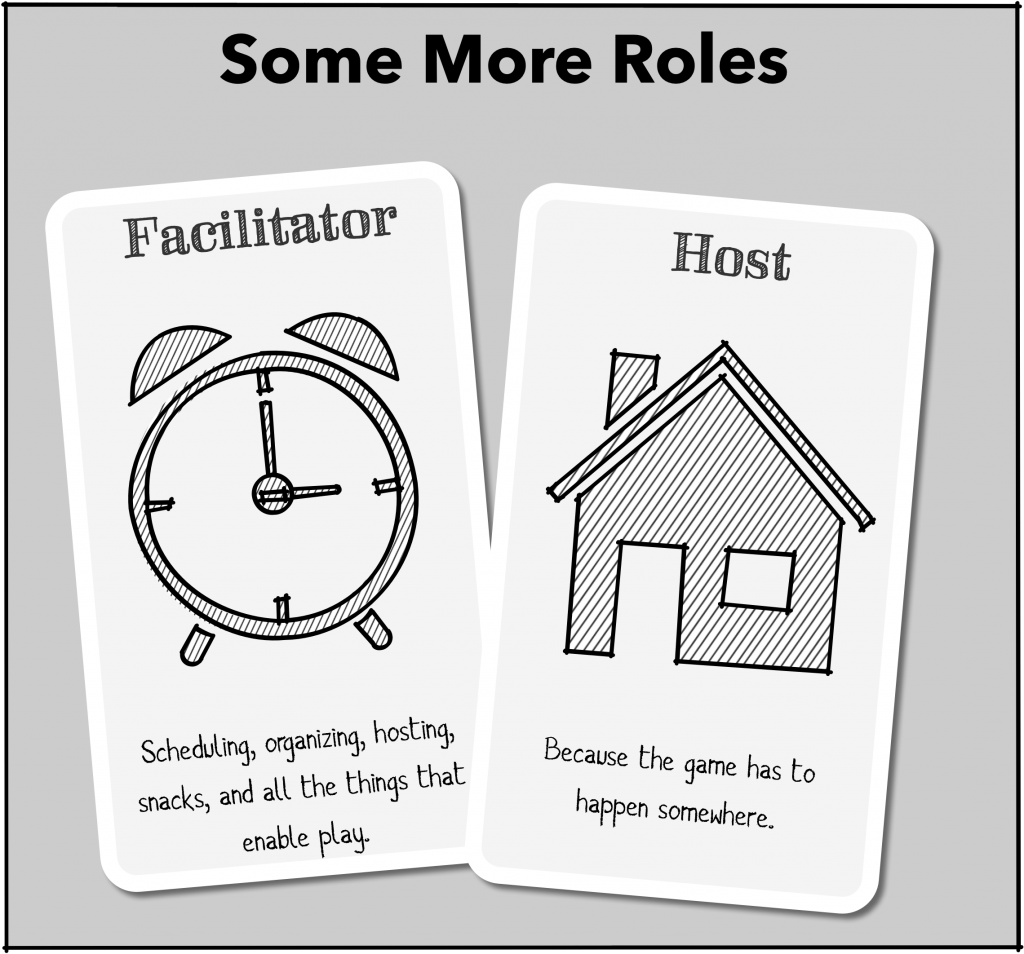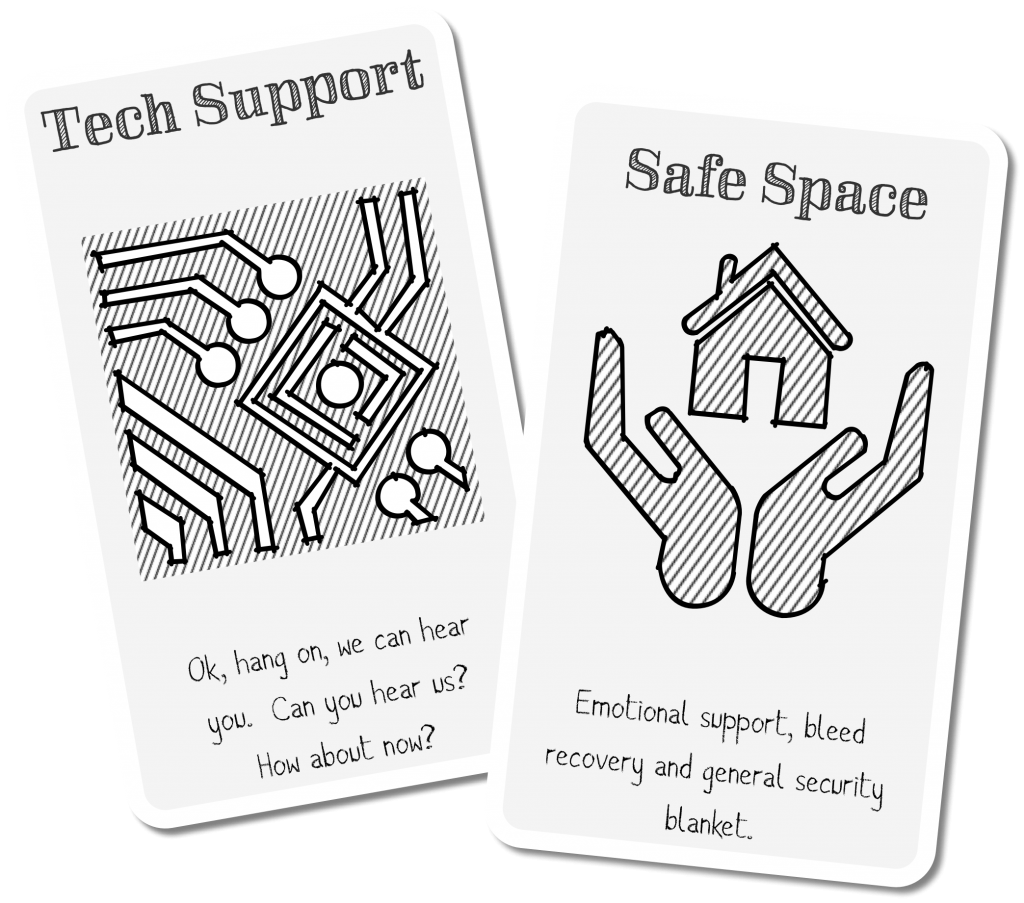So, up til this point I’ve been talking about GM roles in terms of what responsibilities might be picked up by the game. It is possible that the GM can do less heavy lifting as an authority, entertainer or celebrant if the game is designed to account for that.
But there are a couple of other roles that traditionally fall on the GM that are probably not something that the game can provide, the roles of host and facilitator. These are both roles that are outside of the game, but are all the same necessary for the game to happen. The facilitator is responsible for the logistics of the game – scheduling it, making decisions about where it will be, who will be in it, making sure everyone has supplies and generally making the game possible. The host role is complimentary (and sometimes synonymous with) the facilitator – providing space to play and all the things that come with that (parking, seating, lighting, a reasonable environment and so on).
As a young gamer, I developed a habit of considering these to be GM’s roles. Sometimes someone else might take responsibility for hosting, but they tended to take on the minimum responsibility, otherwise deferring to the GM as facilitator. Everything else was pretty much on the GM.
The roots of this were not great. At least in my experience, the GM was the reason the game was happening, and if the GM didn’t make it all happen, then the group could just do something else with their evening. Baked in that is an assumption that the group is kind of grudgingly playing, which is a very high school kind of take on it. I grew older and grew out of those patterns of being embarrassed about my hobby and desperate for players, but that habit that the GM had to “make it go” stuck with me for a long time.
That was pretty dumb.
See, while these roles are ones the game can’t provide, that doesn’t mean that the GM is solely responsible for them. Everyone at the table wants to be there, and this sort of load can be distributed. Hell, doing so will make your game better – not only does it give the GM more bandwidth to focus on what she’s there to do, it helps eliminate lingering ideas of GMs being “in charge” of the game in some creepy or unhealthy way[1]. When the work around a game is everyone’s job, it is easier to accept that it’s everyone’s game.
For some of you, this is all probably obvious. It’s possible that you never fell into the bad patterns in the first place. I genuinely envy you that. But for the GMs out there who are running themselves ragged in service of their games, take a second and consider whether you are clinging to these roles out of genuine necessity, or if it’s just a function of habit.
EDIT: Other roles that have come up in discussion of online play and LARP
1 – Because if you see GMing as being about power, you want to claim as many roles as possible to assert that power, even if it’s a pain. Sure, it may suck to schedule things, but if you get an emotional reward from being in charge, then this helps reinforce that. It’s not automatically a bad thing, but it is a red flag – if your enjoyment of play is predicated on maintaining a power dynamic, there is a good chance you are using the wrong tool to find your happiness.


do you think online gaming can decentralize the host and facilitator roles? or allow the game itself to bear some of the burden to provide them?
Yes, but it also brings new burdens (as anyone trying to get a teleconference to work will testify). Might merit a “tech support” role. 🙂
Not sure that’s a “might” 🙂
I don’t know if my group is an anomaly, but the GM only has authority inside the game. For anything outside of that he has the same vote as anybody else. We do things like changing number of players, approving a new player, deciding our regular play night, etc. by consensus. Anyone can veto a change. We now play at the offered house that’s most central.
We started with the out-of-game group decisions on the GM as you described, but we migrated towards under my (the GM at the time) suggestion, and it’s stayed through more campaigns.
But when it comes down to it, what’s right for each group will vary by table more than anything else. I think the best a rules system could do in terms of the Facilitator role would be to acknowledge it and suggest a few working design patterns on how to do it.
In my personal experience, there have been two instances where the facilitator role was not held by the GM.
In one case a group I had previously run started a new campaign, but one of the players DMed and I joined as a player. Somehow, I ended up still managing the scheduling, etc., for a while. I then passed all of that off to the new DM because planning is really the part I am least keen on. I presume it happened because people were used to me doing that. Therefore, I think the natural association isn’t “the DM does it” but “the person who got the group together does it”.
In a different case, I actively delegated the job of the facilitator to one of the players. That person did not manage to step up to these responsibilities and we didn’t manage to schedule a session for months. The (maybe obvious) take away here is: Some people are not good at organising stuff. If you pass off the facilitator role to someone else, make sure they have at least basic skills in doing so.
I may be an anomaly here, in that my first exposure to gaming mostly ignored these roles. Gaming happened at a particular house on a particular night and time every week, but the actual GM “position” had more to do with which campaign we played, which had more to do with who actually showed up that night. We had a few different campaigns going at any one time and played that one that had all players present. The pattern the group had fallen into by the time I got there was that if we had a configuration of players show up we’d play whichever campaign included all of them, and didn’t have any missing players. If we didn’t have a campaign that matched the configuration, then we’d start a new one. Which did, admittedly, lead to some false start campaigns, but largely that wasn’t an issue for us.
I kind of took that mindset with me when I tried to start campaigns later on, offering to host and defaulting to facilitator, in order to get a game going. Not to say that’s actually worked in my local gaming community, but that’s a different issue entirely.
Think about it also in terms of not just the GM running themselves ragged and distributing their workload but bringing a greater sense of equity to work that may also being done outside a GM role and isn’t credited as work that supports the game.
“When the work around a game is everyone’s job, it is easier to accept that it’s everyone’s game.” can also be rolled into “When all the work that makes a game is considered game work, we value distribution of load differently and more equitably.”
Two additional thoughts on this:
1. Both of these roles, but perhaps the facilitator role especially, can be much more fluid for any given group. The person who was hosting might find their usual space is somehow made off limits for a while so someone else has to offer theirs. The usual facilitator might have to take an extended break, and someone else might start trying to get games going as a result.
2. There’s one extra factor to consider that makes the facilitator role fall more often to the GM. Because the GM is often required to prep the upcoming sessions, if they find themselves unable to attend to this prep, they may have to cancel the game that week. If this isn’t particularly unusual (happening about once per month, let’s say for the sake of argument), then it’s natural that the facilitator role will fall to them: even if someone else tries to schedule a game, they still need to wait on the GM to confirm that the game will happen, if no one else will step up to run something. This obviously doesn’t mean the GM must be the facilitator, but it is a force pushing groups that face this issue towards that trend.